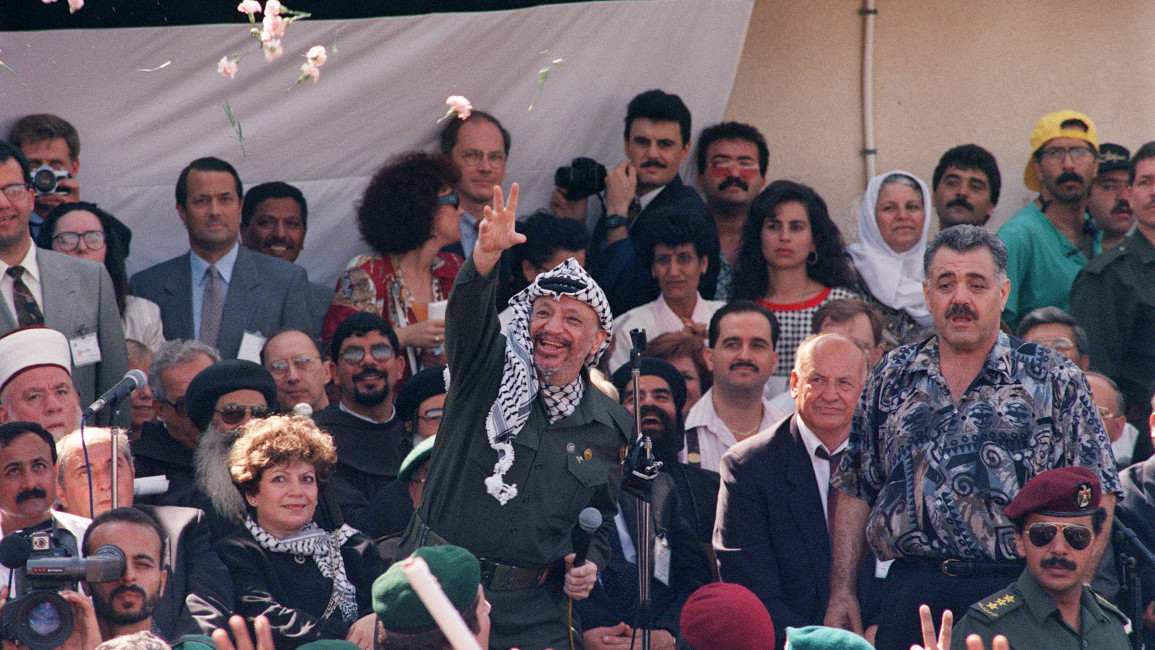
For Generation Oslo, 'peace' is an empty promise
I was nearly five years old and living in Jerusalem when the Oslo Accords were signed in 1993.
My memories from that time are hazy and I seem to remember the atmosphere more than distinct moments. There was a sense of shock and the grown-ups were glued to either their televisions or radios. I couldn’t tell whether someone had died or was getting married.
With the hindsight of several decades, I came to understand these wide polarity in feelings. Some Palestinians were in disbelief and maintained a cautious optimism: the sight of the PLO returning to the West Bank and Gaza, draped in Palestinian flags, was something they thought they would never live to see.
But many others were angry at a leadership who had never set foot in Palestine and had signed an agreement having never seen an Israeli settlement. Indeed Palestinians in Palestine, for the most part, were absent from the PLO committees formed for the negotiations.
"Today, 30 years after the Oslo accords were signed, Palestinian sovereignty is non-existent and the theft of Palestinian land continues to be relentless"
Worse yet, the majority of refugees - the ones who brought Yasser Arafat and the PLO to power - were sidelined from the final agreement, their right of return bargained away and eventually disregarded.
Among those who felt this anger was Palestinian scholar Edward Said. A month after the Oslo Accords were signed, Said published his piece ‘The Morning After’ in which he offers a scathing critique not only of the Accords themselves but also of the PLO leadership.
He described the whole affair as a “degrading spectacle” and “an instrument of Palestinian surrender; a Palestinian Versaille”.
Said wrote with incredible foresight. He saw how Oslo would be used to further fragment Palestinian land and consolidate the Israeli regime’s occupation. He also saw what the PLO and the newly formed Palestinian Authority (PA) would become.
The Oslo Accords were never about peace or justice. 30 years on, they have only served to cement Israel's occupation and settler colonial expansion, while allowing the world to abandon the Palestinian cause, writes @Yara_M_Asi 👇 https://t.co/3HPuhHiST2
— The New Arab (@The_NewArab) September 13, 2023
He poignantly warned that, “we should remind ourselves that much more important than having a state is the kind of state it is”.
I am from what is colloquially known in Palestine as jeel Oslo (generation Oslo) - those that grew up in the shadow of the accords. We have some memories of life before the Accords but the majority of our life has been defined by them.
For so many, Oslo has become a timestamp, much like the way people talk about life pre-Covid and post-Covid. Palestinian time has long been defined by the Nakba (the ethnic cleansing of 1948). But increasingly so, many of my generation talk of a time before Oslo with nostalgia and longing.
This may seem bizarre. After all, the Israeli occupation still existed in its full brutality before Oslo. Yet it was also a time when the Palestinian leadership was yet to be fully co-opted into our people’s oppression.
It was a time when there was still a modicum of hope that the leadership would still return to liberate Palestine from Zionist settler colonisation.
It was a time when Palestine was less geographically fragmented, and it was still possible to go to the seaside in Gaza and then head home to Jerusalem in the evening. Something that is completely unimaginable now.
Today, 30 years after the Oslo accords were signed, Palestinian sovereignty is non-existent and the theft of Palestinian land continues to be relentless. Meanwhile, the invasion and violent disruption of Palestinian communities continues to be a feature of life across the West Bank and Gaza.
Earlier this year Jenin refugee camp was brutally invaded by Israeli regime forces, who brought tanks, thousands of ground troops, and even launched missiles- a sight unseen in the West Bank since 2002. Despite the massive devastation and destruction, Palestinians resisted and the community of Jenin camp came together to care for one another and rebuild.
"Thirty years on from Oslo and the situation is dire. But as Said explains in his piece, it is important to maintain the pessimism of the mind and optimism of the will"
When PA officials visited the camp after the invasion they were booed and eventually kicked out. Later, the PA President Mahmoud Abbas had to visit the camp with a massive security detail, his unpopularity amongst the crowd was palpable.
This speaks to Said’s warning of the kind of “state” that would develop under the conditions of the Oslo Accords. The PA has become an authoritarian governing body, with its powers limited to providing services to Palestinians living in ever-shrinking bantustans and to share security information with the Israeli regime to prevent a Palestinian uprising.
The latter, known as the security coordination, is a condition of Oslo and is hugely unpopular with the Palestinian people. Even though from time to time the Palestinian leadership threatens to end this coordination with the Israeli regime, it proves to be nothing but empty words.
The existence of the PA is essentially predicated on the existence of the security coordination. Fundamentally, it has become native enforcers of the colonial status quo often using brutal tactics to do so.
In addition, the PA is responsible for its own monumental amount of human rights abuses, documented by both Palestinian and international human rights organisations.
Thirty years on from Oslo and the situation is dire. But as Said explains in his piece, it is important to maintain the pessimism of the mind and optimism of the will.
Whilst the political situation for Palestinians has never looked so bad, at the same time, the Palestinian people remain adamant in their survival and resistance to Zionist colonisation.
It is from this that we can hold on to a sliver of optimism and hope.
Yara Hawari is the Senior Analyst of Al-Shabaka, the Palestinian Policy Network.
Follow her on Twitter: @yarahawari
Have questions or comments? Email us at: editorial-english@newarab.com
Opinions expressed in this article remain those of the author and do not necessarily represent those of The New Arab, its editorial board or staff.




